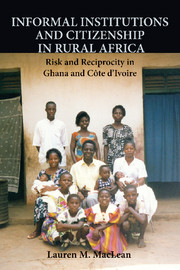 Informal Institutions and Citizenship in Rural Africa
Informal Institutions and Citizenship in Rural Africa Book contents
- Frontmatter
- Contents
- List of Tables and Figures
- List of Abbreviations
- Acknowledgments
- PART I THE TRANSFORMATION OF INFORMAL INSTITUTIONS OF SOCIAL RECIPROCITY IN GHANA AND CÔTE D'IVOIRE
- 1 Introduction
- 2 The Informal Institutions of Reciprocity: A Quantitative Puzzle and Analysis
- 3 Local Conflicts Over the Meaning of Reciprocity: A Qualitative Analysis of Change
- PART II LEGACIES OF THE STATE ROLE IN MEDIATING RISK IN GHANA AND CÔTE D'IVOIRE
- PART III INFORMAL INSTITUTIONS OF RECIPROCITY AND THE PROSPECTS FOR DEMOCRATIC CITIZENSHIP
- 8 Conclusion
- Appendix
- Bibliography
- Index
- Titles in the series
3 - Local Conflicts Over the Meaning of Reciprocity: A Qualitative Analysis of Change
Published online by Cambridge University Press: 05 May 2010
- Frontmatter
- Contents
- List of Tables and Figures
- List of Abbreviations
- Acknowledgments
- PART I THE TRANSFORMATION OF INFORMAL INSTITUTIONS OF SOCIAL RECIPROCITY IN GHANA AND CÔTE D'IVOIRE
- 1 Introduction
- 2 The Informal Institutions of Reciprocity: A Quantitative Puzzle and Analysis
- 3 Local Conflicts Over the Meaning of Reciprocity: A Qualitative Analysis of Change
- PART II LEGACIES OF THE STATE ROLE IN MEDIATING RISK IN GHANA AND CÔTE D'IVOIRE
- PART III INFORMAL INSTITUTIONS OF RECIPROCITY AND THE PROSPECTS FOR DEMOCRATIC CITIZENSHIP
- 8 Conclusion
- Appendix
- Bibliography
- Index
- Titles in the series
Summary
In much of Africa, the meaning of reciprocity within the family, friends, and village community is quite openly and regularly discussed in the course of daily life. In Ghana and Côte d'Ivoire, reciprocity appears often as the subject of a Sunday sermon or the theme of a provocative bumper sticker in bushtaxis, “tro-tros,” and buses. Perhaps because the informal institutions underpinning support to families and communities are under such pressure and are in the process of being contested, they are frequently at the center of stories, gossip, jokes, and even tales of witchcraft. This chapter uses interpretive qualitative methods to analyze these public elements of popular discourse in combination with transcriptions of informal interviews, focus group discussions, and survey interviews. I explore how the meaning of reciprocity has narrowed and become more market-oriented in recent years but in surprisingly different ways for the village residents of culturally similar regions of Ghana and Côte d'Ivoire.
INFORMAL INSTITUTIONS OF RECIPROCITY AT THE VILLAGE LEVEL: WHAT IT MEANS TO HELP
At the village level, the informal institutions of reciprocity might be defined more simply and accurately as whether and how people help each other over time. But even the very notion of “help” was different for people in various economic, social, and cultural contexts. While respondents immediately and frequently referred to monetary assistance, many local people in both the Ghanaian and the Ivoirian regions mentioned a variety of nonmonetary helps that were considered equally (and sometimes more) important.
- Type
- Chapter
- Information
- Informal Institutions and Citizenship in Rural AfricaRisk and Reciprocity in Ghana and Côte d'Ivoire, pp. 65 - 96Publisher: Cambridge University PressPrint publication year: 2010
